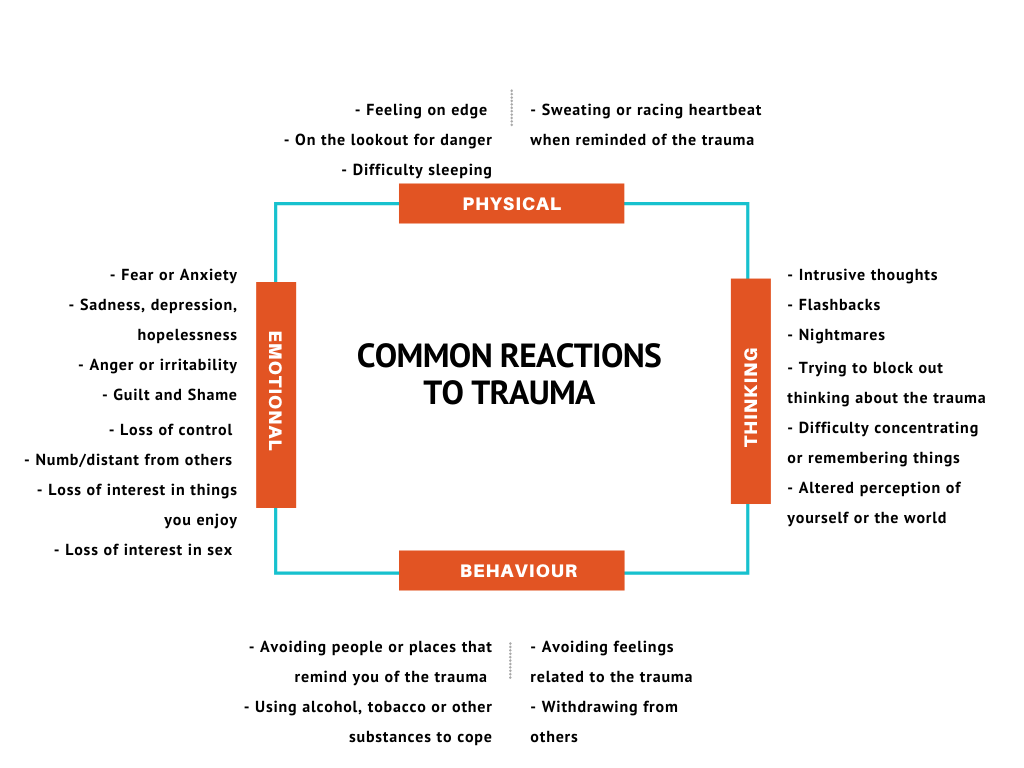What is trauma?
A traumatic event is any event which causes serious harm to a person’s physical, mental or emotional wellbeing. This can include a direct traumatic experience, as well as witnessing trauma happen to someone else.

Traumatic events may only occur once, or may be drawn out over a period of time. Common examples include road accidents, natural disasters, global crises (e.g., COVID-19), assault, domestic violence or prolonged abuse and life threatening illness.
How common are traumatic experiences?
3 out of 4 people in Australia experience at least one traumatic event in their lifetime. Traumatic events can be very difficult to come to terms with, but it is important to remember that you are not alone and help is always available.
How do people react to traumatic events?
It is normal to experience an overwhelming physical or emotional reaction during a traumatic event. These events can also have ongoing long-term effects on the way you think, feel and act.

Trauma and co-occurring substance abuse
For some people, experiencing a traumatic event does not necessarily require treatment. The initial symptoms will subside over the course of a month or so, and individuals will adjust as their feelings settle.
For others, the effects of traumatic experiences may last for several months and develop into conditions such as depression, Post Traumatic Stress Disorder (PTSD) and other anxiety disorders. In order to cope with the feelings that arise after experiencing trauma, some people will use substances such as alcohol and other drugs. Whilst this may provide a sense of relief in the short-term, in the long-term, it can make a person’s physical and mental health worse. This can become and ongoing cycle where trauma reactions trigger cravings for substance use (i.e., comorbidity).
How are trauma symptoms treated?
It’s important to recognise that traumatic events have different effects than other stress-causing life events. Therefore, the recommended treatments are different to those used to overcome other mental health problems.
Effective treatments that are available for responding to trauma include:
- Psychological therapies (or ‘talk therapy') which focus on helping people to overcome stressful thoughts and memories.
- Medication may also be helpful in some cases, but not all.
Tips for staying well
Acknowledge and respond to the need for self-care and self-compassion
Traumatic experiences are distressing and emotionally exhausting. Take the time to acknowledge that strong reactions to trauma are normal and can last for a long period of time after the traumatic experience. Show yourself the same kindness you would show to a friend or loved one that has had a traumatic experience. Don’t be angry or disappointed in yourself because of your emotions. Try to invest your time and energy into taking care of yourself, rather than punishing yourself for the way you feel.
Find time for the things you enjoy
Rest and relaxation will help you to stay well and enjoy life, eat healthy foods and maintain daily exercise.
Allow yourself time to disconnect from your everyday thought patterns
Exercises in mindful listening and mindful movement can bring your attention inward and are often helpful in reducing negative thoughts.
Avoid or limit alcohol and/or other drugs
Using alcohol and/or other drugs can intensify the responses to traumatic experiences resulting in heightened or prolonged effects. It is important to talk with your doctor about your alcohol and/or substance use if you have experienced a traumatic event, particularly if you are also taking prescribed medication. Alcohol and/or other substances can interfere with the way prescription medications work. In some cases, this may cause unexpected negative reactions so it is important to share this information with your doctor.
Techniques for staying well
There are techniques you can learn and apply that will help to ease the feelings of distress associated with traumatic experiences. The following techniques will provide the best results when applied over time, so don’t give up if you don’t start to see results immediately. Staying well takes time and effort - click and practice these techniques regularly and often for the best results.
Self-soothing
This technique helps you to calm and relax yourself. By incorporating a strong focus on your sensory experience and thought patterns, over time, you can develop strategies for remaining calm during stress.
Coping with cravings
Cravings are sometimes unavoidable and can be overwhelming if you don’t have a way to cope with them effectively. This resource will provide you with some techniques to shift your attention away from the cravings until the feeling subsides and you are able to carry on with your day.
Mindful listening
These exercises help to become aware of your surrounding environment and tune in to the sensations you feel. In doing so, mindful listening can clear repetitive and unwanted thoughts that may be affecting your mood.
Where can you get help?
In an emergency, call Triple Zero (000).
You can also contact your local GP, or call/click the following services:
Beyond Blue: 1300 22 4636
eCliPSE Service Locator
Kids Helpline: 1800 55 1800
Lifeline: 13 11 14
National Alcohol and Other Drug Hotline: 1800 250 015